- Home
- Tony Roberts
The Commissar Page 10
The Commissar Read online
Page 10
But that was there; what was more important to him was his role with the Red Army. The war with the Ukraine was his immediate concern, and to help the men around him in trying to keep them alive, and to win the war. His experience was so important, not only to them, but to him, too. Casca may be immortal, but he sure as hell hurt when he got shot or bayonetted or burned and so on.
Their first action came before a village that lay in their path. A few enemy soldiers defended it, but they were border guards and not that well-trained, and in the face of such overwhelming numbers withdrew, bringing news of the Soviet advance to their superiors. Belgorod would be where the local Ukrainian leaders would be based, that was for sure.
There was a road junction here, where two mud tracks converged. One led north-south while the side road led east. The village was of a group of wood and mud huts, and around it were pens and runs for pigs and other animals. The animals were gone, of course, probably taken by one of the armies in the current war. The Germans hadn’t gotten this far so it wouldn’t have been them.
Casca had told the men that the Germans were going home and that they were not to be shot at if any were seen, but outside Kursk he doubted they would see any. They occupied the village and waited further orders. The locals cowered in their homes while hordes of young, arrogant, filthy men wearing red stars on their uniforms strutted about.
Casca stationed men he could rely on to keep order while he looked for a place to sleep in for the coming night. A house he knocked on was answered by a scared looking woman. “Yes?” she asked in a soft, trembling voice.
“Greetings,” he smiled, trying to make her feel more at ease, “I’m Commissar Kaskarov. My men and I are looking for lodgings for the night.”
“There is little room here,” she said, looking over Casca’s shoulder at the rows of men walking along the street, clouds of breath coating their heads. The sound of tramping feet on the iron-hard mud filled the air.
“I’m aware of that!” Casca said, dying to get into the relative warmth of the house. “The men need a space such as a barn or the like. Do you own any?”
“No – I have this house and that is it. My husband died in the war. My children – they are no more. The recent plague, you see.” Casca could see the red-rimmed eyes. Weeping, still. Plague. Yes, that had swept the land in the last month or two, a flu, rather than anything like the plague of old.
“I see. So, my men will pitch camp outside here and make sure nobody else will intrude.”
She nodded. “Thank you – Commissar. There is room for a few in here,” she bowed to pragmatism.
Casca waved to the junior officers with him. “These two will sleep here tonight as well as I.”
She stepped back and allowed Casca entry. He turned to the lieutenants. “Go make sure the men are camped and then return. I shall organize sleeping berths for you.”
“Thank you, Comrade Commissar.”
The woman, who introduced herself as Maria, was in her late twenties. She had been the daughter of a blacksmith and had married a local minor land owner. She had been one of the prettiest girls in the village. Two girls had been born and when they had been seven and nine, the war had begun.
The man had gone to join the army and been killed in Galicia, along with a few million other Russian soldiers, and then the flu had taken the two girls. Maria was now wondering where her future lay. Casca looked around the house. It was better than the standard Russian peasant’s hovel. She looked nervously at Casca. He did look frightening, what with his size and build, and that scar down one side of his face. The red star on his fur hat made him seem to much more powerful, and someone accordingly to be feared.
Maria wasn’t stupid. “C-Comrade?”
Casca looked at her. Her place was bereft of many items that he would have expected to see on the shelves or in niches. Personal things. All had gone but little traces of dust told the story to him. “Yes?”
“I-If I make love to you – could you – get me some food?”
Casca guessed that was the issue. People in these places were starving. All the available food was going to the army. “Grazhdanin,” he said, calling her citizen, he detested the word ‘comrade’ with a passion, “you do not need to sell yourself for food. I will provide some for you.”
She shuddered and nodded. But she still needed reassurance. “I will still wish you to share my bed, Comrade.”
Casca shrugged. If she insisted; he didn’t want to appear ungrateful. He guessed she was doing it for extra insurance that nobody else would invade her property. If she slept with this man, then he would ‘claim’ her for the night.
She was emotional; she wept after he made love to her, and it was almost as if she was pouring out all her grief, fears, and pent-up feelings of the past few years in one go. He had been gentle and considerate with her, not the rough, boorish ignorant manner of some Casca had seen when taking advantage of a frightened woman selling herself. No, she had enough on her plate and he wanted to show her that at least here was someone who still had feelings in this mad crazy world.
“Why didn’t you come into my life before?” she asked him softly when she had stopped weeping. She ran a finger down his scar. “This war is madness. It makes people mad.”
“War does that. The world is changing, but it cannot change until those who wish it so have defeated those who don’t wish it so. And war is merely the state that exists in between periods of diplomacy.” Casca couldn’t remember who first said that, but he had heard it and it went into his head like so many other sayings. Another was ‘war is diplomacy by other means’.
All well and good for people like him, who were soldiers and who did it for their living, but it nearly always hurt people like Maria. Widows, orphans, misery. She sighed gently. “Perhaps, yes. But you are the first who has been like this, not a vile animal. Where did you come from? And why fight for the Reds?”
“You don’t support the Reds?” he asked, picking up an edge to her voice.
“Oh, no, I didn’t mean that!” she said fearfully. “It’s just that anyone who I’ve met involved in this war has up to now been the same, whether they be Red, White or any other color in between.”
“I chose the Reds because they champion the people over the ruling elite who have sent them to mindless death in the recent Great War. Simple as that. Let the people decide whether they want to be murdered in their millions, not be sacrificed for some prince’s pleasure.”
Maria chuckled softly. “You sound like a Commissar alright. The Reds were here before, but their policemen, the Cheka, took away a few of our neighbors who didn’t agree with what they said. Rumor is they were shot.”
“Really?” Casca said thoughtfully. “For what, disagreeing over a political argument?”
“The Cheka do that. Don’t you know?”
Casca peered into the darkness. Astapenko would do something like that. He was sick enough. Maybe Casca ought to find out what the Cheka really did. In the meantime… “Let’s not think of that now. Let us forget the world outside for this one night.” He kissed her throat, her collarbone, and lower. He enjoyed the groan that escaped her lips. Her body pushed up against his, eager, hungry. Yes, she wanted more of him. She cried out in pleasure when he captured a nipple and sucked, and she pushed her breast firmly into his face. “More!” she gasped.
“I want you to beg for it, Maria,” he grinned. “I want to hear you, do you understand?”
“Yes, yes!” She squirmed and writhed. The heat from her body was banishing any winter cold that sat in the room. Under their blankets it was tropical. “Don’t hold back!”
And he didn’t, not this time around.
CHAPTER ELEVEN
They finally met resistance in front of Belgorod. The UNR had decided enough was enough and had scraped together enough soldiers to block the Soviet advance. Having to deal with two thrusts was hard enough to face, and Kiev was their main area of defense. They didn’t want the key city of the Oblast to
fall if they would help it, though, so they dug in outside the city.
The land was still relatively flat, although they had come up a slope, a long gradual rise, to a level stretch of land. In the distance they could see the city, and off to the left was a low ridge running north-south covered in trees and snow.
The UNR troops were dug in behind ice, snow and fallen logs. The ground had been too hard to dig up and the defenders hadn’t had time to prepare adequate defenses, so it was a delaying action while the city was evacuated. No doubt the administration was retreating to Kharkov, further south. The Donets River ran through the center of the city, and it lay across the Reds’ line of advance.
Casca had suggested that they pin the defenders against the river and move in on the flanks, crushing the UNR forces that way, but the commissar was advised his area of interest was the troops’ morale and political instruction, and that he should leave the military matters to the officers.
Casca had spat in the snow and walked off. Kirilov had watched him with interest. That commissar knew his tactics. Why wasn’t he in the army proper? He himself tried to nudge the commanders towards Casca’s suggestion but these men were set in their ways of the direct frontal attack. These were former Tsarist army officers recruited into the Red Army by Trotsky because of a lack of experienced and effective officers otherwise. Far from refusing, these officers welcomed the offer, being utterly disillusioned by the shambles the Russian army had descended into before the Bolshevik revolution.
Casca lay across the ground, peering forward at the unmistakable line of Ukrainian defenses. He had acquired a pair of field glasses, one of the privileges his rank had. He found that mostly he had just to ask and it would be provided. Kirilov came up alongside, wriggling into position, his nose red, his teeth chattering. “Well, Comrade,” he said, “the orders are to attack across ground and overwhelm the enemy.”
“As I suspected,” Casca grumbled. “They don’t learn, do they?”
“We have superior numbers and fire power.”
“Yes but we have to attack across ground. Alright, so what do these officers suggest? We hurl political slogans at them in the first instance and then walk in and accept their surrender?”
Kirilov grinned. “Not quite. We have artillery. They will bombard the UNR’s lines and then once they’ve finished, we charge and wipe up what’s left.”
“Theory’s wonderful,” Casca declared, “shame the reality is usually different.”
Kirilov grunted and moved off to talk to more units waiting to be sacrificed for the greater good of communism. Casca grimaced. It was always some ideal or flag or prophet or better world that compelled people to fight and die. The irony was those who fought never saw the fruits of victory; it was always those who gave the orders from the safety of rooms hundreds of miles away. They would fight to the last drop of their soldiers’ blood.
Casca eyed the army officers crouching to the rear. He twisted around. “Comrades,” he said loudly, “how can you give true leadership and an example to your men if you are not prepared to show them where they must go? You must set the example!”
The men grinned. They liked this acidic-tongued Commissar who was prepared to shame the officers in front of them. Casca touched the red star in the center of his fur cap to reinforce his suggestion. Party policy. The captains grumbled and shuffled forward to come alongside their men. One eyed him with such hostility that Casca unfastened his holster and brought out his Nagant M1895 revolver. He liked this weapon; it had an unusual action in that the cylinder moved forward when cocked, so it closed the gap that in other revolvers let gas escape, reducing the muzzle velocity. This one had a much greater velocity and made it more accurate. The only downside was it took longer to reload.
Commissars had been given explicit instructions to use it on those who refused to obey orders, something Trotsky had imposed in order to restore discipline. Casca thought it ironic; before they took power the Bolsheviks had been destroying army morale and discipline. Now they were working hard to undo the damage they had done. Casca hadn’t had cause to use it, but the reputation of other commissars was sufficient to make Casca feared by the army officers. The message was clear: obey party policy or else.
Casca’s attitude was that he was fed up with the officers sending men to their death. If the officers ran alongside the men then at least all could die together; that was true communism in his eyes. Everyone was equal. Death was the ultimate equalizer. It cared little if you were king or peasant, rich or pauper. Death came to all and it made no distinction as to who it was.
The bombardment began and the ground shook, and the men cringed and blocked their ears. Whoever it was laying down the barrage they were damned accurate; the Reds were no more than a hundred yards from the UNR positions. Tree trunks were thrown up into the air along with severed limbs, decapitated heads and sandbags.
Screams rent the air in between the explosions. It went on for twenty minutes, turning the ground into a shattered mess. Then as silence descended upon the men, the officers put whistles to their mouths. “Now! Up! Up and at them!”
Casca scrambled to his feet, waving the soldiers forward, pistol now back in its holster and his Mosin-Nagant rifle in both hands. “Urrah!” he yelled, encouraging the others to do so.
In a wave of green khaki they stumbled forward, bayonets gleaming wickedly, a few red banners fluttering over their heads. “For the revolution!” a few yelled.
Casca ran as hard as he could, his legs and lungs used to this kind of thing. He’d run like this so many times before. Gettysburg was one such occasion, as they closed in on the Union lines on Cemetery Ridge, and then there had been the recent fighting in Flanders for the British, in Gallipoli for the Australians, Transylvania for the Romanians and the Ukraine for the Russians. So he was back again but this time for the Bolshevik cause.
Shots rang out. As always, there were survivors. Men stumbled and fell. Casca put in a burst of extra energy and closed the gap to the enemy lines. It was especially ruined here; two shell holes lay ahead and the logs that had been lain down here had been blown away. Bodies lay with their blood and entrails all over the ice and snow and powdered mud, but a few brave Ukrainians were still shooting.
A man went down to Casca’s right and the Eternal Mercenary stopped and aimed carefully at one of the defenders who was working another round into the chamber. Casca’s bullet took the man through the head, its contents exploding out the other side. The soldier jerked spasmodically, then slumped and remained still.
His comrade looked shocked for a second, then swung his head to look at Casca. The scarred Eternal Mercenary ran forward, leaping over the crumbling edge of the shell-crater and landed alongside the UNR man. Casca’s bayonet was rammed into the man’s neck and down into his lung cavity.
A quick pull and Casca was beyond him. Another soldier had just fired and turned to meet Casca. The initial attack by the former Roman legionary smashed the UNR man’s rifle aside. Casca kept the circle turning and sent the butt of his Mosin-Nagant into the man’s jaw, sending him over onto his back. A bayonet thrust and the soldier was another casualty of war.
“Bastard!” a man screamed to the left. A UNR soldier was aiming at Casca. The commissar had just enough time to hurl himself to one side, but even so the bullet took him through the ribs on his right hand side.
It was like being kicked by a mule. Casca crashed into the piled-up mixture of ice, snow and dirt. His rifle was sent skidding away somewhere. The Ukrainian came for Casca, determined to run him through and finish him off. Pistol. Casca wrenched it out and cocked it. It made a comforting clicking sound. The 7.62mm bullet blasted into the UNR soldier’s chest at 891 feet per second, pitching him backwards.
Getting to his feet was agony. That fucking bullet had broken a couple of ribs, definitely. Lucky it was a jacketed round, rather than the soft-nosed ones of the Colt 45. It had drilled through him. Grimacing, he checked his uniform. Ruined. Shit. How was he going to ex
plain this and stay on his feet?
He grabbed his rifle once more. He clutched his ribs. Already re-knitting. The blood would have congealed and blocked any more leakage, but there would be an exit hole in his greatcoat, stained with blood.
He moved on, gasping with the pain. The UNR soldiers were running. Losses had been too high and they were broken in too many places to be able to stem the red tide. Belgorod was just ahead, the outskirts a collection of peasant’s huts. The railway line was away to the left and swung into the city from the east, avoiding the high ground that rose just before the city proper.
The industry would be close to the center of the city. Belgorod meant White City in Russian, and from what Casca had seen, it probably meant something to do with the limestone around, as there were outcrops of it protruding from the ground where they were not covered in ice or snow.
He reached a hut and paused, looking at his blood-stained hand. That would have to be cleaned and carefully, too. As his blood was pure poison, any one taking it into their mouth would die horribly and pretty damned fast.
More soldiers were passing by to either side, seeking enemies, but the defenders were running hard. They didn’t have the manpower to stop the Red Army taking the city, and they would fall back to Kharkov and try to stop the advance that way, but without the Germans to stiffen their ranks, it was doubtful they could do that. The only possible salvation the UNR had was a White advance from the Rostov area by Deniken’s Whites, and that was a poisoned chalice, for the Whites were just as eager to snuff out Ukrainian independence as the Reds.
Reds against Whites, both against the UNR, Poles against the Ukraine, Cossacks against the Reds. God! It was too complicated for words. Casca’s main aim was for the moment to get patched up and recover. A soldier came running up to him. “Comrade – are you alright? You’ve been shot!”

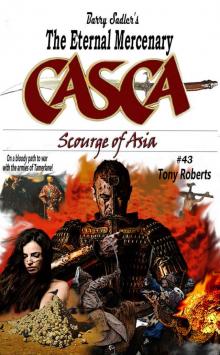 Casca 43: Scourge of Asia
Casca 43: Scourge of Asia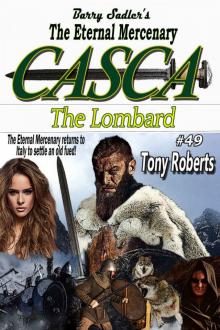 The Lombard
The Lombard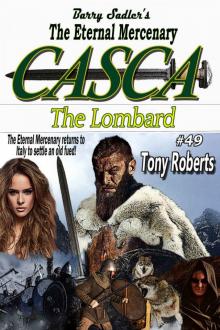 Casca 49: The Lombard
Casca 49: The Lombard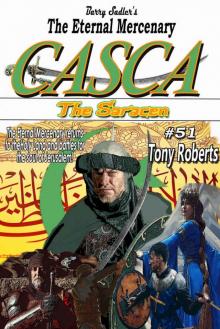 The Saracen
The Saracen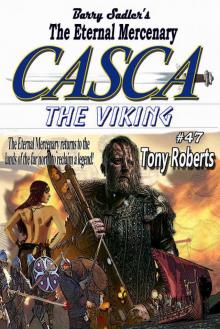 Casca 47: The Viking
Casca 47: The Viking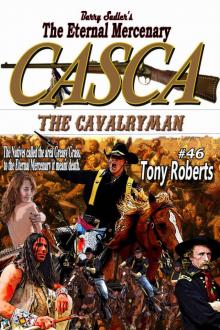 Casca 46: The Cavalryman
Casca 46: The Cavalryman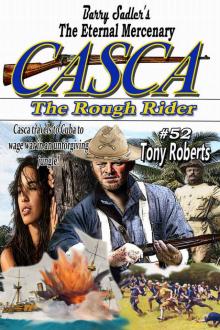 Casca 52- the Rough Rider
Casca 52- the Rough Rider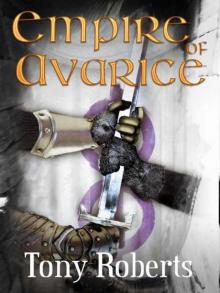 Empire of Avarice
Empire of Avarice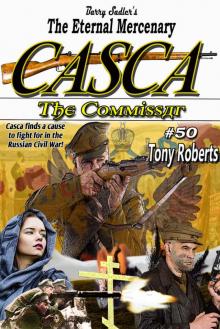 The Commissar
The Commissar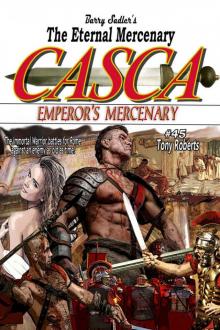 Casca 45: Emperor's Mercenary
Casca 45: Emperor's Mercenary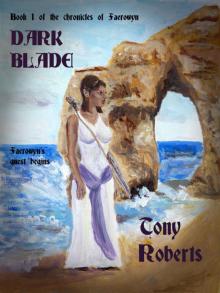 Dark Blade
Dark Blade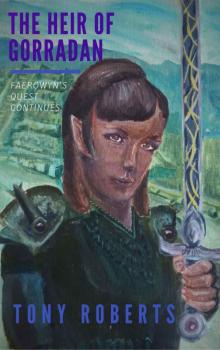 The Heir of Gorradan (Chronicles of Faerowyn Book 2)
The Heir of Gorradan (Chronicles of Faerowyn Book 2)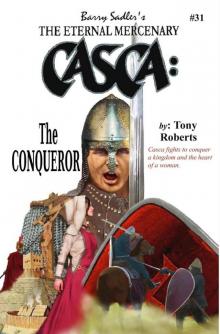 Casca 31: The Conqueror
Casca 31: The Conqueror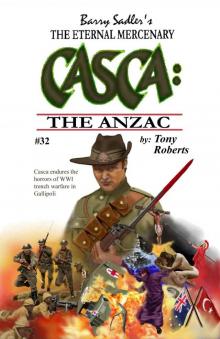 Casca 32: The Anzac
Casca 32: The Anzac The Anzac
The Anzac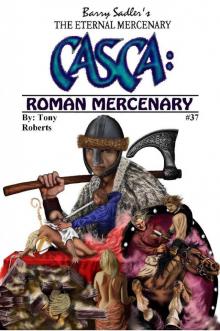 Casca 37: Roman Mercenary
Casca 37: Roman Mercenary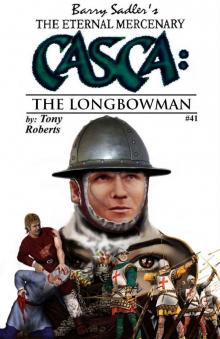 Casca 41: The Longbowman
Casca 41: The Longbowman The Longbowman
The Longbowman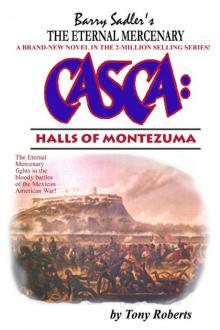 Casca 25: Halls of Montezuma
Casca 25: Halls of Montezuma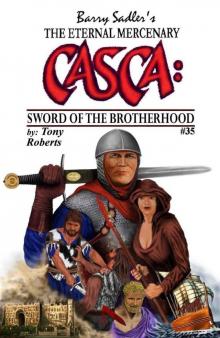 Sword of the Brotherhood
Sword of the Brotherhood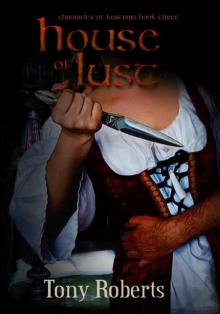 House of Lust
House of Lust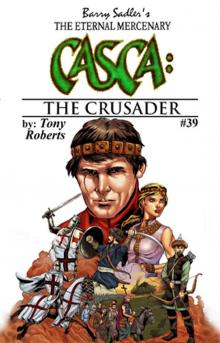 Casca 39 The Crusader
Casca 39 The Crusader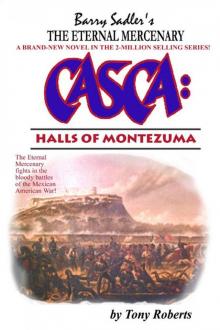 Halls of Montezuma
Halls of Montezuma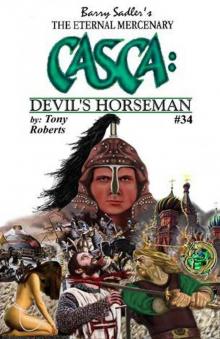 Devil's Horseman
Devil's Horseman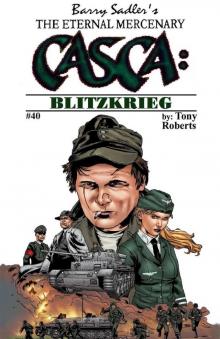 Casca 40: Blitzkrieg
Casca 40: Blitzkrieg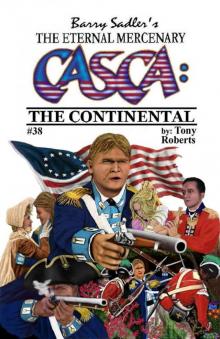 Casca 38: The Continental
Casca 38: The Continental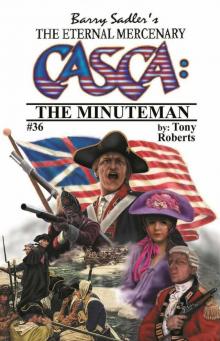 The Minuteman
The Minuteman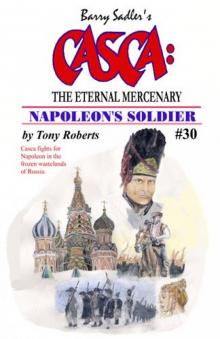 Napoleon's Soldier
Napoleon's Soldier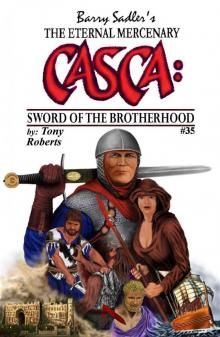 Casca 35: Sword of the Brotherhood
Casca 35: Sword of the Brotherhood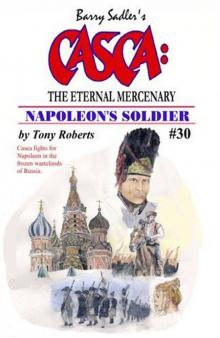 Casca 30: Napoleon's Soldier
Casca 30: Napoleon's Soldier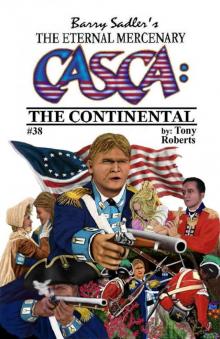 The Continental
The Continental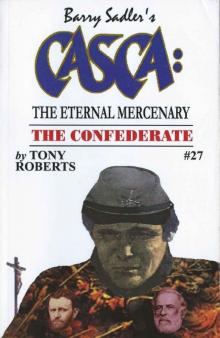 The Confederate
The Confederate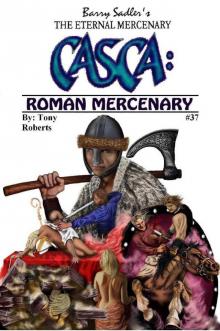 Roman Mercenary
Roman Mercenary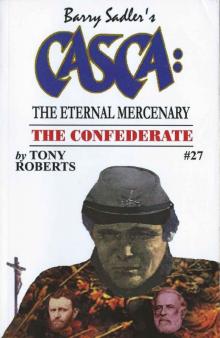 Casca 27: The Confederate
Casca 27: The Confederate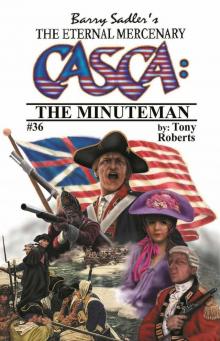 Casca 36: The Minuteman
Casca 36: The Minuteman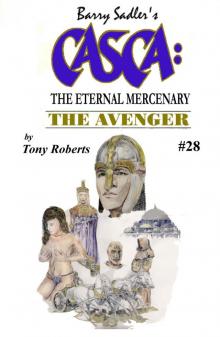 Casca 28: The Avenger
Casca 28: The Avenger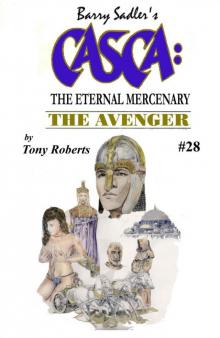 The Avenger
The Avenger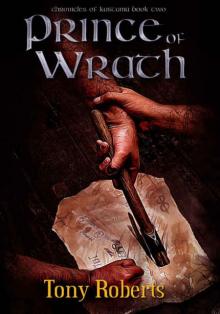 Prince of Wrath
Prince of Wrath